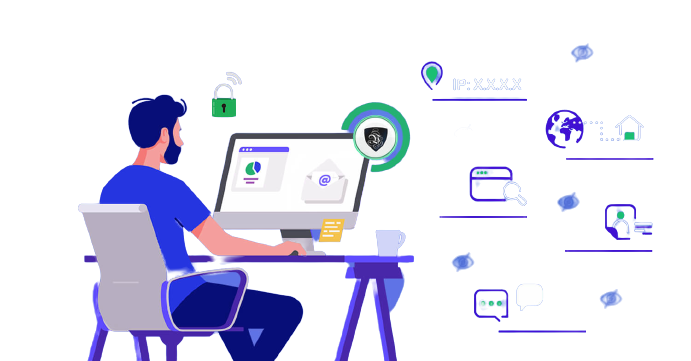
Welcome to the digital era, where remote work has become more prevalent than ever before. With the rise of flexible schedules and virtual office spaces, employees are no longer confined to their cubicles. Instead, they can work from anywhere in the world with just a laptop and an internet connection, this is how VPN for Remote Workers came to life.
But as exciting as this newfound freedom may be, it also comes with its fair share of risks. When you connect to public Wi-Fi networks or access sensitive company information outside of your secure office network, you expose yourself to potential cyber threats. That’s where a Virtual Private Network (VPN) comes into play and VPN for remote workers.
In this blog post, we will explore why every remote worker should use a VPN for added security and peace of mind. We’ll delve into how a VPN works, discuss its benefits for remote workers, guide you on choosing the right VPN service provider, and provide some tips on setting up your own VPN for remote work purposes.
So grab your favorite cup of coffee (or tea!) and let’s dive deeper into the world of VPNs for remote workers!
What is a VPN and How Does it Work?
A VPN, short for Virtual Private Network, acts as a secure tunnel between your device (whether it’s a laptop, smartphone, or tablet) and the internet. It encrypts your data and routes it through a remote server located in another geographical location.
When you connect to the internet without using a VPN, your online activities are exposed to potential eavesdropping by hackers or even government surveillance agencies. But with a VPN in place, all of your online traffic becomes encrypted and virtually impossible for anyone else to intercept.
So how does this encryption process actually work? Well, when you use a VPN client on your device and connect to one of their servers around the world, all of your data is encapsulated within an encrypted tunnel. This means that any information you send or receive over the internet cannot be read by anyone other than yourself and the intended recipient.
In addition to securing your data transmission, using a VPN also changes your IP address. An IP address is like an online identifier that reveals information about where you’re connecting from. By masking your real IP address with one from another location provided by the VPN server, you can access geo-restricted content or websites that may otherwise be blocked in certain countries.
All in all, think of a VPN as an invisible shield protecting you from prying eyes while navigating the vastness of the internet. It ensures that not only are your personal details kept private but also grants you greater freedom to explore various online resources without limitations imposed by geography or censorship policies.
Benefits of Using a VPN for Remote Workers

When it comes to remote work, ensuring the security and privacy of your data is crucial. That’s where a Virtual Private Network (VPN) can be a game-changer. Let’s explore some of the benefits of using a VPN for remote workers.
Improved Data Security and Privacy
One of the primary reasons why remote workers should use a VPN is enhanced data security and privacy. By encrypting your internet connection, a VPN creates a secure tunnel that protects sensitive information from potential hackers or prying eyes. This means that even if you’re connected to public Wi-Fi networks, your data remains safe.
Accessing Geo-Restricted Content
Another advantage of using a VPN is the ability to access geo-restricted content. Whether you need to access certain websites or online services that are only available in specific regions, a VPN allows you to bypass these restrictions by masking your IP address and making it appear as if you’re browsing from another location.
Increased Productivity and Efficiency
A reliable VPN can also significantly enhance productivity and efficiency for remote workers. With its ability to provide fast and stable connections, you no longer have to worry about slow internet speeds hindering your workflow. You can seamlessly collaborate with colleagues, upload/download files, or attend virtual meetings without interruptions.
Cost-Effective Solution for Businesses
For businesses with remote teams spread across different locations, implementing individual security measures on each device can be both time-consuming and costly. However, by utilizing a single VPN solution for all employees, companies can save money while ensuring consistent protection across their workforce.
Choosing the Right VPN for Remote Work
When selecting a suitable VPN service for remote work purposes, consider factors such as server locations, encryption protocols offered, ease-of-use interface, customer support availability, and compatibility with various devices/platforms – including laptops, smartphones, and tablets, to ensure seamless connectivity regardless of which device employees are using.
Improved Data Security and Privacy
When it comes to remote work, data security and privacy should be at the top of every worker’s priority list. With sensitive information being transmitted over the internet, there is always a risk of interception by hackers or unauthorized individuals. This is where a VPN (Virtual Private Network) can provide peace of mind.
A VPN creates a secure and encrypted connection between your device and the internet, ensuring that all data sent and received remains private and protected. By encrypting your online traffic, a VPN makes it virtually impossible for anyone to intercept or decipher your sensitive information.
Additionally, using a VPN hides your real IP address and replaces it with one from the server location you choose. This not only adds an extra layer of anonymity but also prevents websites or online services from tracking your online activities.
What do you gain using a VPN as a Remote Worker?
By using a VPN for remote work, you can confidently connect to public Wi-Fi networks without worrying about potential risks such as malicious actors snooping on your data. The encryption provided by the VPN ensures that even if someone manages to intercept your network traffic, they won’t be able to make sense of it without decryption keys.
Furthermore, many employers require their remote workers to access company resources remotely. A VPN allows secure access to internal servers and databases while maintaining confidentiality. Whether you’re accessing confidential client files or collaborating on important projects with colleagues across different time zones, utilizing a VPN ensures that all communication remains private.
Moreover, certain countries have strict censorship policies or geo-restrictions on content available online. Remote workers may find themselves unable to access essential tools or resources due to these limitations. However, by using a VPN service with servers in different locations around the world, remote workers can bypass these restrictions and gain unrestricted access.
Accessing Geo-Restricted Content

One of the major perks of using a VPN for remote work is the ability to access geo-restricted content. When you connect to a VPN server located in another country, your IP address is masked and replaced with one from that specific location. This tricks websites and online services into thinking you are accessing them from within that region.
This is particularly useful for remote workers who often need to access content or online platforms that may be restricted based on their physical location. For example, if you are working remotely from a different country and need to access your company’s intranet or file-sharing system a VPN can help bypass these restrictions.
Additionally, many streaming services like Netflix have different libraries available depending on your location. By using a VPN, remote workers can enjoy unrestricted access to international content libraries no matter where they are physically situated.
Internet Censorship
Furthermore, some countries have stringent internet censorship policies that block certain websites or social media platforms altogether. With a VPN in place, remote workers can navigate around these limitations and freely browse the internet without any hindrances.
It’s important to note that while using a VPN allows you to bypass geo-restrictions and gain access to blocked content, it’s essential to respect copyright laws and licensing agreements when streaming or downloading copyrighted materials.
Utilizing a VPN as a remote worker opens up endless possibilities by granting access to geo-restricted content across various regions globally. Whether it’s for work-related purposes or simply enjoying entertainment options from different parts of the world during downtime, having this capability at your fingertips enhances your overall digital experience while ensuring privacy and security along the way!
Increased Productivity and Efficiency
In today’s fast-paced digital world, remote work has become increasingly popular. With the flexibility to work from anywhere, many individuals are opting for this setup. However, along with the freedom comes certain challenges that can hinder productivity and efficiency. This is where a VPN can make all the difference.
A VPN provides a secure connection between a remote worker’s device and their company’s network. By encrypting data transmissions, it ensures that sensitive information remains confidential. This peace of mind allows employees to focus on their tasks without worrying about potential security breaches or unauthorized access.
Moreover, using a VPN enables remote workers to bypass content restrictions imposed by certain countries or organizations. Whether it’s accessing social media platforms or streaming services, having unrestricted internet access means employees can stay connected with colleagues and find inspiration wherever they may be.
How can VPN help me?
Furthermore, a VPN eliminates geographic barriers by providing virtual access to company resources such as files and applications. Remote workers no longer need to rely on slow file transfer methods or complicated setups; they can simply connect to their organization’s network through the VPN and seamlessly collaborate with team members in real-time.
By streamlining workflows and reducing time-consuming processes, a VPN enhances overall productivity for remote workers. It eliminates unnecessary delays caused by physical distance and empowers employees to complete tasks efficiently regardless of their location.
In addition, utilizing a VPN saves businesses money by eliminating the need for costly infrastructure investments such as dedicated leased lines or setting up additional servers at each remote location. Instead, companies can provide secure access through an affordable subscription-based model offered by reputable VPN service providers.
To ensure optimal performance when using a VPN for remote work purposes, it is crucial to choose the right provider that offers reliable connections with minimal downtime or bandwidth limitations. Factors such as server locations should also be considered depending on specific business needs.
Setting up a VPN for remote work is typically straightforward thanks to user-friendly interfaces provided by most service providers. Employees can easily install and configure the VPN client on their devices, connect to the
Cost-Effective Solution for Businesses

Businesses around the world are increasingly embracing remote work as a cost-effective solution. With the rise of technology, it has become easier than ever for employees to work from anywhere, whether it’s from home or while traveling.
However, with this newfound flexibility comes the need for enhanced security measures to protect sensitive data and ensure privacy. This is where a VPN (Virtual Private Network) becomes an invaluable tool for businesses.
By using a VPN, remote workers can establish a secure connection between their device and the company’s network. This means that all communication and data transmission are encrypted, making it nearly impossible for hackers to intercept or access sensitive information.
Not only does a VPN provide improved data security and privacy, but it also allows remote workers to bypass any geo-restrictions on websites or services they may encounter while working remotely. Whether it’s accessing company resources or streaming content from different regions, a VPN gives employees unrestricted access to necessary tools and information.
In addition to enhancing security and providing unrestricted access, using a VPN can also increase productivity and efficiency among remote workers. By utilizing secure networks provided by VPNs, employees can connect seamlessly with colleagues and clients without worrying about compromised connections or slow internet speeds.
From a business perspective, implementing a VPN is not only cost-effective but also essential in today’s digital landscape. The potential risks of cyberattacks far outweigh the investment required in setting up reliable virtual private networks for remote workforces.
When choosing the right VPN provider for your business needs, consider factors such as speed performance, strong encryption protocols,and compatibility across multiple devices used by your workforce.
Choosing the Right VPN for Remote Work
When it comes to choosing the right VPN for remote work, there are a few key factors to consider. First and foremost, you want to ensure that the VPN provider offers strong encryption protocols. This will help protect your data and keep it secure while you’re working remotely.
Another important factor to consider is the server network of the VPN provider. The more servers they have the better.
Speed is also crucial when selecting a VPN for remote work. You don’t want your connection to lag or slow down significantly when using a VPN, as this can hinder your productivity. Look for providers that offer fast and stable connections.
Additionally, it’s worth considering whether the VPN service has dedicated apps for all of your devices. This will allow you to easily connect and stay protected across multiple platforms such as laptops, smartphones, and tablets.
Take into account the customer support offered by the VPN provider. In case you encounter any issues or have questions about setting up or using their service, having reliable customer support can make all the difference.
Choosing the right VPN for remote work requires careful consideration of factors such as encryption protocols, server network size and speed capabilities. By taking these aspects into account along with device compatibility and customer support options provided by each potential provider; finding an optimal solution tailored specifically towards enhancing security while working remotely becomes much simpler!
Setting Up a VPN for Remote Work
Now that you understand the benefits of using a VPN as a remote worker, let’s dive into how to set it up. The first step is selecting the right VPN provider for your needs. There are several options available, so take the time to research and compare their features.
Once you’ve chosen a provider, you’ll need to install their software or app on your device. Most reputable providers offer user-friendly interfaces that make this process quick and straightforward. Simply follow the prompts and enter any required information.
Next, configure the settings according to your preferences. This may include choosing server locations, enabling automatic connection on startup, or adjusting security protocols. Don’t forget to set up multi-factor authentication for an extra layer of protection.
After setting up your VPN, test its functionality by connecting to different servers and accessing various websites or applications relevant to your work. Make sure everything is working smoothly before relying on it for sensitive tasks.
Remember that while a VPN provides added security and privacy, it’s not foolproof. Stay vigilant with other cybersecurity practices such as using strong passwords, regularly updating software and devices, and being cautious about phishing attempts.
By following these steps and taking precautions along the way, you can enjoy secure remote work with peace of mind knowing that your data is protected from potential threats online.
Best VPN for Remote Workers
HideIPVPN offers a VPN service with military-grade encryption, and high-speed servers with unlimited bandwidth.
Our service comes with shared IP addresses so that your activity can never be tied to one particular user, further protecting your privacy.

We also offer DNS leak protection, a Kill Switch, the latest VPN protocols, and a guaranteed no-log policy.
Best VPN Deal! Get HideIPVPN for $2.7/mo!
Every purchase you make comes with a 30-day money-back guarantee.
Potential Risks and Precautions to Take
While using a VPN has its benefits, it is important to be aware of the potential risks associated with remote work and take necessary precautions. One common risk when using a VPN is the possibility of connection drops or leaks, which can expose your sensitive data. To mitigate this risk, ensure that you choose a reputable VPN provider that offers reliable connections and strict privacy protocols.
Another potential risk is the use of unsecured public Wi-Fi networks. When working remotely, it’s tempting to connect to any available network for convenience. However, these networks are often vulnerable to hackers who can intercept your data. To protect yourself, always use your VPN when connecting to public Wi-Fi and avoid accessing sensitive information unless absolutely necessary.
It’s also crucial to keep your devices updated with the latest security patches and antivirus software. This helps safeguard against malware and other cyber threats that could compromise your personal information.
Additionally, be cautious about downloading files or clicking on suspicious links while connected through a VPN. Malicious websites or downloads could potentially bypass the protection offered by your VPN, so exercise caution when browsing online.
Regularly review the privacy policy of your chosen VPN provider to understand how they handle user data. Look for providers that have a strict no-logs policy and prioritize user privacy.
By being aware of these potential risks and taking appropriate precautions, remote workers can enjoy the benefits of using a VPN while maintaining their online security and privacy.
Conclusion
In today’s fast-paced world, remote work has become increasingly common. As more and more individuals embrace the flexibility of working from anywhere, it is essential to prioritize data security and privacy. This is where a VPN comes into play.
By using a VPN for remote work, you can ensure that your sensitive information remains secure while accessing the internet. Whether you’re connecting to public Wi-Fi networks or remotely accessing company resources, a VPN creates an encrypted tunnel that shields your data from prying eyes.
Moreover, with a VPN, you can bypass geographical restrictions and access region-specific content effortlessly. This means that even if you are working in one part of the world while needing access to resources in another location, a VPN can make it possible without any hassle.
Using a VPN also contributes significantly to increased productivity and efficiency for remote workers. With reduced risk of cyber threats and improved access to necessary tools and resources, employees can focus on their tasks without worrying about compromising their digital security.
Other Benefits
Additionally, implementing a VPN solution for remote work proves to be cost-effective for businesses. Instead of investing in expensive infrastructure or relying on less secure alternatives like proxy servers or virtual private servers (VPS), companies can opt for affordable yet reliable VPN services that cater specifically to remote workers’ needs.
When choosing the right VPN service provider for your remote work requirements, consider factors such as server locations, speed performance, encryption protocols offered, customer support availability,and user-friendliness of the interface.
Setting up a VPN is relatively straightforward. Most reputable providers offer easy-to-follow instructions or dedicated applications that allow users to connect seamlessly with just a few clicks.
While using a VPN provides numerous benefits,it is crucial to be aware of potential risks associated with its usage as well.
To mitigate these risks,take precautions such as regularly updating your device’s operating system,enabling multi-factor authentication,and being cautious when clicking on suspicious links or downloading files from untrusted sources.



